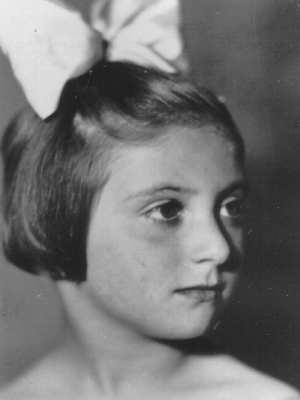
Greti, the daughter of Emery and Stefania (Bley), was three years old when the Germans occupied Czechoslovakia. Her father worked in the family hardware store. The Germans immediately began persecuting and brutalizing the Jewish residents of her town. When they confiscated her father's store, he lost his livelihood. Greti's father desperately searched for a way to survive.
Through a friend, he was able to obtain false baptism certificates, giving the family a new identity. They changed their last name to Skala and moved to Bratislava, the capital city of the region. The family lived as best as they could under wartime conditions. They constantly lived in fear that they would be betrayed. Greti began school and became the top student in her class. She even helped her Christian classmates with their religious lessons.
In early 1944, Hungary seemed to be a relatively safe haven. Greti's father obtained visas for Hungary. Soon after their arrival at a Hungarian hotel, the Germans occupied Hungary. The Skala's were recognized as Jews and denounced. Handed over to the Nazis, Greti and her parents were deported to the Ravensbrueck concentration camp in Germany.
Conditions in Ravensbrueck barely sustained life. The Germans were determined to stave their prisoners to death. Typhus-carrying vermin infested the entire camp. Eight year-old Greti and her mother managed to stay alive. In April 1945, as the Allies approached, Greti and her mother, along with thousands of sick and starving inmates, were evacuated from Ravensbrueck and forced to march westward. Many hundreds died of exhaustion, while others were shot. Some were even killed by allied bombs.
They arrived at Bergan-Belsen, a camp filled with dead and dying prisoners. In May 1945, the camp was liberated. Greti, who had contracted typhus in Bergen-Belsen, and her mother were sent home in trucks to Bratislava. Greti was immediately hospitalized. She soon died. Greti was only nine years old.

